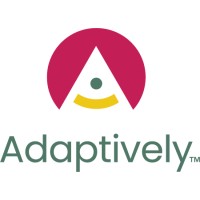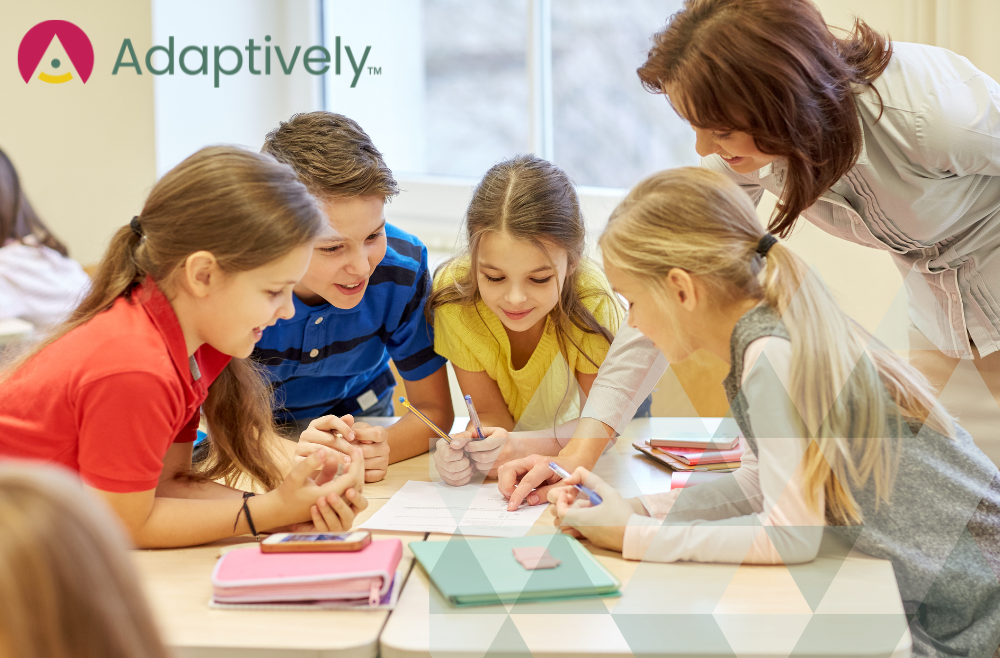As educators, it’s easy to cringe when we see that group assignment looming closer and closer in our lesson plans. However, you know the benefits of group work: Your students learn to communicate better, delegate tasks, and coordinate ideas for a cohesive outcome. Not to mention, as the teacher, you’ll have five projects to grade instead of twenty-five.
But it’s hard to ensure everyone stays on task, divides the work evenly, and gets along. To help, Adaptively has put together a list of effective strategies to ensure your students receive the learning benefits from group work in the classroom.
Define Success
Children find it difficult to complete tasks when they don’t fully understand the expected outcomes. Whether the final result is a project, a presentation, or a research paper, ensure that your students understand what the final result should look like and what each person should contribute. For example, a well-defined project could be:
- A 10-minute presentation in which every group member speaks for the same amount of time, presenting a different point.
- A model of the solar system made out of classroom materials. Each group member is responsible for creating two planets and sharing five facts about each.
By offering your students the project specifics and even a model of a completed project, your students will know the expectations they must meet to achieve success.
Break Down Tasks
When you assign the project to your students, discuss or provide an outline of its components and the timeline for completion. Then, as the project progresses, establish checkpoints throughout until it’s complete. For example, students may have to turn something in to show their work progression, or each group could hold a mini-conference with you. This strategy ensures that the groups work together, advance their projects, and hit deadlines.
Example: Groups of 3-4 students will dress up as philosophers from a specific period and deliver a scripted conversation they could have had. The individual tasks could be something like this, with days/dates next to each step:
- Each group member chooses a philosopher.
- Each group member researches that philosopher and takes notes.
- Students decide on the subject of their conversation and draft their script.
- Students revise their script based on feedback from the teacher.
- They brainstorm costumes (to be completed outside of class).
- Finally, they perform their conversation in costume in front of the class.
Foster Communication Among Teammates
By breaking down the project into smaller goalposts and describing what a successful project should look like, you will ensure that your students have their best shot at receiving a good grade and achieving learning outcomes. However, for children who are still learning to communicate and collaborate, there is always a possibility that something will go wrong. For example, there may be a disagreement over which student was supposed to provide a material or complete a task. Or, perhaps, one student struggles to speak their opinions, while another steamrolls their classmates.
To foster positive peer communication, give the students ample time to work on group projects during class. Monitor groups from a distance to watch how the students interact. Make yourself available to answer questions and resolve disputes. Finally, if students need to collaborate outside of class, have them determine and describe to you how they will contact one another.
Hold Each Student Accountable
Nearly everyone has experienced working on a group project with someone who didn’t do their part. And yet, that student ended up with the same grade as all their team members. It’s frustrating and demoralizing for the students who worked hard, and it feels unfair. Often, the teacher suspects that certain students worked harder than others but has no way to prove it.
How can you hold every student accountable? Consider having project groups submit a list of how they divided the project’s jobs, or ask them to label each part of a physical project with the person who worked on it.
Let Your Students Know Why Group Work Is Important
In the end, group work in the classroom is a necessary part of education. Projects help students learn to collaborate with their peers, develop responsibility, and solve problems while considering different perspectives. They will use these skills well into their careers beyond high school and college. Share examples of real-life group work from various professions to help your students connect the “why” behind their group assignments.
Are your students learning everything they’ll need to succeed? Adaptively’s all-inclusive learning management system can ensure that your students’ English and math skills are progressing so that they can crush their academic goals now and career goals later. Contact us today for more information about our leading-edge enrichment education program.


